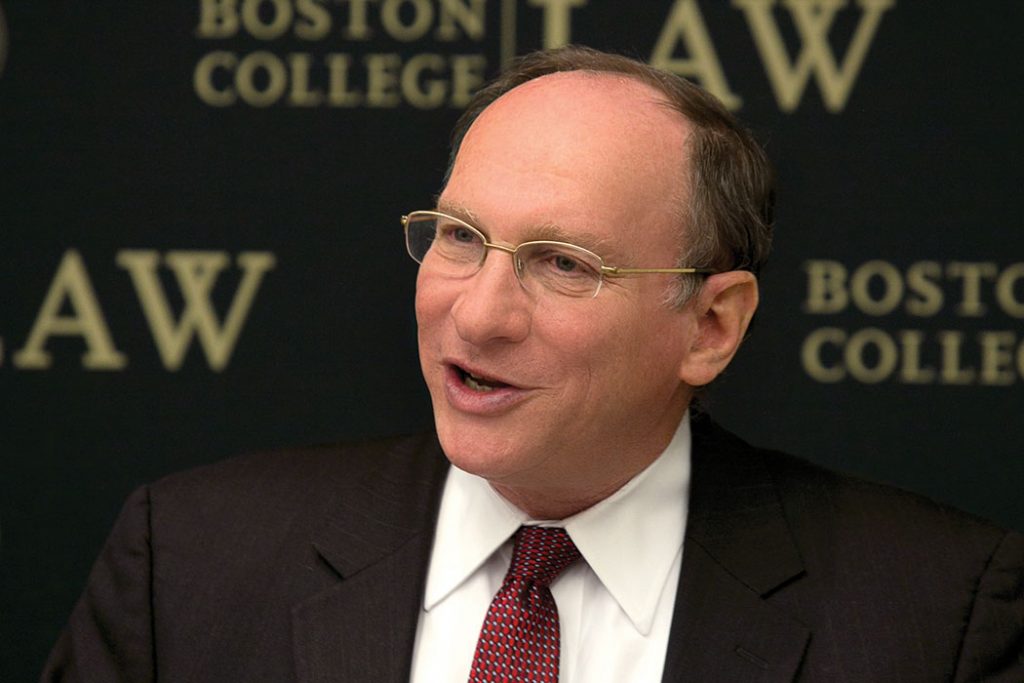Massachusetts Supreme Judicial Court Chief Justice Ralph Gants, a legendary figure in Massachusetts jurisprudence, who passed away unexpectedly in September of 2020 at the age of 65, left a gaping hole in the Massachusetts legal community.
Boston College Law Review honored his legacy in a virtual symposium on April 9. The event featured opening remarks from Dean Vincent Rougeau, tributes from former Governor Deval Patrick, among other luminaries, and convened three distinguished panels honoring the influence Justice Gants had on access to justice, criminal justice, and equity in the legal profession.
First appointed to the SJC by Deval Patrick in 2009, Gants was elevated to Chief Justice in 2014. There, he advocated for progressive change, fostering a forward-looking perspective that shifted the bar’s views on diversity, inclusion, and the well-being of legal practitioners.
Speaking to his impact on the legal profession, Marilyn Wellington, executive director for the Massachusetts Board of Bar Examiners, remembered Gants’ ability to look beyond the present moment to see the “larger purpose.” Under his tutelage, Massachusetts became a national model in policies and practices surrounding bar admission.
Wellington specifically noted the work Gants did to revolutionize how the mental health struggles of law students are looked upon during the bar application process. Realizing that law students were risking their own well-being by avoiding mental health treatment for fear it would jeopardize their admission to the bar, Gants crusaded to remove mental health-related inquiries from the bar admission process. Wellington explained that initial support on the national level was tepid. But, Gants’ tenacity and advocacy on this issue resulted in the National Board of Bar Examiners unanimously agreeing to remove mental health related questions from the bar application in February 2019.
Shaun Khan, president of the New England Muslim Bar Association, turned the conversation to issues of diversity and inclusion. He recalled how Gants made it a priority to join the Muslim community for Friday Juma prayer at least once a year. There, Gants would reassure the Muslim American community that the Massachusetts judiciary “would always work to protect the religious freedom of those in the Commonwealth.” On a particularly memorable occasion, Gants read an excerpt from the Soviet Constitution purporting to protect religious freedom, a lesson that “without an independent judiciary, constitutional rights are just words on paper.”
A theme throughout the day was Gants’ focus on action. Khan remembered a meeting where Gants promised to enact cultural trainings in courts, reduce recidivism in the Muslim community, increase the number of Muslims on the bench, and support the well-being of Muslim lawyers. Khan had heard it from people in power before. Gants “got the ball rolling within 48 hours.”
This sentiment was echoed by Sheriece Perry, co-director of Support Services for the Massachusetts Trial Court. Perry saw Gants take “bold, intentional, and courageous” action over and over again, and “he didn’t take weeks to do so.” According to Perry, “if he said he was going to do something, he did it. If he said he cared about something, he cared about it wholeheartedly.”
As a young Black attorney dealing with the discrimination and bias of the legal system, Perry looked to Gants for inspiration, seeing him as someone who “had a passion and commitment to represent people that look like me.” She applauded Gants’ understanding that “there is a time to step forward and a time to step back,” and that the present moment “was a time to step back and listen to what others had to say.”
April English, chief of organization development and inclusion at the Massachusetts Attorney General’s Office, remembered that Gants “made it simple: pay attention and focus, then act to bring about change.” Importantly, English saw Gants work to recognize his own bias and the bias of the system he was a part of. Gants led by example, and his example effectively called on the entire Massachusetts legal community to effect change.
The panels also included personal touches. Gavin Alexander, a former clerk of Gants and the first full-time fellow of the SJC’s Commission on Lawyer Well-being, spoke movingly of his friendship with the late Justice. Alexander recounted how Gants helped him during a particularly trying time in his career. Alexander, struggling with the workload and lack of support at his law firm, had reached a tipping point. The first person he reached out to in the legal community was Gants, who validated his feelings, offered his help, and ultimately convened a permanent steering committee on lawyer well-being. According to Alexander, this is just one example of the “genuine, impactful, and radical change that would not have happened without Gants.”
Rachel Ramirez Gants, Justice Gants’ daughter and a successful lawyer in her own right, reminded attendees that her father’s final focus had been on reforming the criminal justice system in Massachusetts. “He was a man who loved to see things through,” she said. “See it through for him.”
A special Boston College Law Review print edition on the symposium will be published in the Fall of 2021.
Photograph by Reba Saldanha


